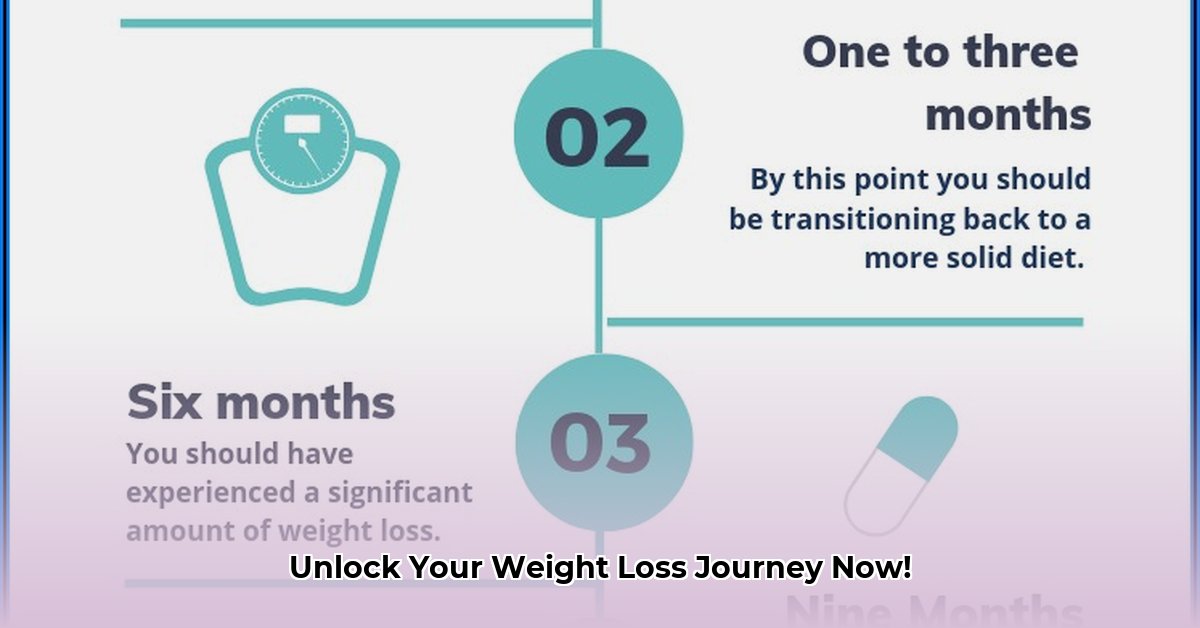
Embarking on a gastric bypass journey is a significant decision. Understanding the weight loss timeline helps set realistic expectations and fosters long-term success. This isn't a linear path, but a journey with distinct phases, each requiring a tailored approach. Let’s explore this transformative process step-by-step.
The Initial Phase: Rapid Weight Loss (Months 1-3)
The first few months post-surgery often bring rapid weight loss – your body's initial response to the procedure. You might lose a considerable amount, perhaps 17% of excess weight in the first month, followed by another 8-18% over the next two months. This early success is motivating, but this rapid pace is unsustainable.
Actionable Steps for Months 1-3:
- Adhere strictly to your post-operative diet: Your surgeon and dietitian provide a detailed plan crucial for health and weight loss maximization.
- Regular check-ups are non-negotiable: Consistent appointments monitor progress, address concerns, and adjust your plan as needed.
- Start with gentle exercise: Begin with short walks. Gradually increase intensity and duration as strength allows. Listen to your body.
The Adjustment Period: A Slower Pace (Months 3-12)
After the initial rapid loss, the pace slows. Don't be discouraged! This "plateau phase" is normal. Your body adapts, and weight loss becomes more gradual. You'll likely see another 15-25% weight loss during this time, but it won't happen overnight. This phase requires patience and a refined approach.
Actionable Steps for Months 3-12:
- Prioritize patience: This is not a race. Celebrate progress and focus on consistency. Small, sustainable changes are key.
- Refine your strategy: Work closely with your dietitian to adjust your eating plan.
- Maintain consistent activity: Incorporate regular exercise to aid weight loss and improve overall well-being.
The Long Game: Sustaining Your Success (Month 12 Onward)
Reaching the one-year mark is a major achievement. You've likely achieved a substantial portion of your weight loss goal – perhaps 60-70% of excess weight. Now the focus shifts to long-term maintenance – establishing a healthy lifestyle for life.
Actionable Steps for Long-Term Success:
- Prioritize regular exercise: Make physical activity a habit. Aim for at least 30 minutes of moderate-intensity exercise most days.
- Develop sustainable healthy eating habits: Create a balanced diet you can maintain long-term.
- Seek ongoing support: Connect with support groups or therapists for encouragement and guidance. Maintaining a healthy lifestyle is a lifelong commitment.
Understanding Your Gastric Bypass Weight Loss Timeline: A Visual Guide
The following table offers a general guideline. Individual results vary significantly.
| Time Period | Expected Excess Weight Loss (%) | Key Considerations |
|---|---|---|
| Month 1 | ~17% | Rapid weight loss; adapt to dietary changes |
| Month 3 | ~25-35% | Weight loss slows; maintain dietary discipline |
| Month 6 | ~45-55% | Potential plateau; optimize lifestyle for continued success |
| Year 1 | ~60-70% | Significant progress; focus shifts to maintenance |
| Years 2+ | Maintenance | Ongoing lifestyle adjustments for lifelong well-being |
Navigating Potential Challenges
While gastric bypass offers significant benefits, potential challenges exist. Nutritional deficiencies are possible, necessitating regular blood tests and vitamin supplements. Weight regain, often linked to reverting to old habits or insufficient activity, can occur. Addressing both physical and emotional aspects is vital for long-term success.
A Holistic Approach to Lasting Success
The gastric bypass journey encompasses more than just weight loss. It's about transforming your relationship with food and fostering a healthy lifestyle. It demands commitment, patience, and a holistic approach. Are you prepared for this transformative journey?
Key Takeaways:
- Gastric bypass surgery initiates significant weight loss, but maintaining it requires long-term commitment and lifestyle changes.
- The initial rapid weight loss phase transitions to a slower, more challenging phase requiring consistent effort.
- Long-term success hinges on ongoing lifestyle adjustments, nutritional awareness, and consistent exercise.
- Addressing potential challenges like plateaus and nutritional deficiencies is crucial for achieving lasting results.
- Ongoing support systems are invaluable for navigating the emotional and physical aspects of this transformative journey.